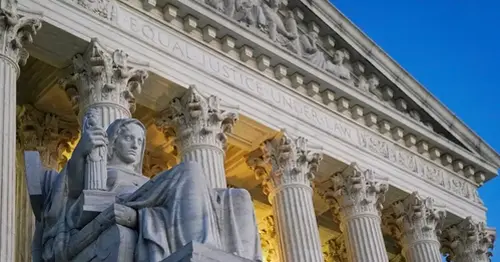
In blow to unions, Supreme Court rules company can pursue strike damage claim
WASHINGTON — In a loss for organized labor, the Supreme Court on Thursday ruled in favor of a concrete company in Washington state seeking to revive a lawsuit against the International Brotherhood of Teamsters alleging that a strike damaged its product.
The 8-1 decision, written by Justice Amy Coney Barrett, means the company, Glacier Northwest Inc., can pursue a lawsuit against the union in state court over an August 2017 strike in which drivers walked off the job, leaving wet concrete in their trucks. The company claims the union is liable for what it says was intentional damage to its product.
Barrett, one of the court's six conservatives, wrote that a state court was wrong to dismiss the claims at such an early stage in proceedings based on its concern that the claims conflicted with the National Labor Relations Act, a federal law that protects union activity.
"Because the union took affirmative steps to endanger Glacier's property rather than reasonable precautions to mitigate that risk, the NLRA does not arguably protect its conduct," Barrett wrote.
Organized labor advocates had raised concern that a ruling in favor of the company could stifle strike actions by opening up unions to damages claims for a wide variety of potential losses employers can face as a result of such activities.
Liberal Justice Ketanji Brown Jackson dissented, saying the ruling "risks erosion of the right to strike." Jackson's two liberal colleagues, Elena Kagan and Sonia Sotomayor, joined the court's conservative justices in the majority.
Jackson pointed out that the National Labor Relations Board issued a complaint after the state court ruling, charging the company with unfair labor practices and saying the drivers’ actions were “arguably protected.”
By ruling in favor of the company, the court "inserts itself into this conflict, proceeding to opine on the propriety of the union's strike activity," despite not being the best place to weigh the facts, she wrote.
"This case is Exhibit A as to why the board — and not the courts — should ordinarily take the first crack at resolving contentious, fact-bound labor disputes of this nature," she added.
The dispute centers on an incident in which members of Teamsters Local 174 went on strike after negotiations broke down over a new collective bargaining agreement.
When truck drivers walked off the job, the company says, some of the concrete already being delivered was rendered useless. Drivers returned trucks to the company’s facility, some of which had partial or full loads on board. As a result of the strike, concrete was left in the trucks and had to be removed to harden and then be broken up before it could be disposed of, the company says.
The union says that when the workers returned the trucks, the cement was wet, and that they left the drums on the trucks rotating, meaning it would not immediately congeal. It was the company’s decision to remove the concrete and then break it up once it hardened, the union says.
Glacier says it lost $100,000 as a result of failing to fulfill a contract on the day of the strike, and it also claims additional damages. The company says it was able to do the previously scheduled work the following week.
The Washington Supreme Court ruled for the union in December 2021, saying any loss of concrete was “incidental to a strike arguably protected by federal law.”
Noel Francisco, the company’s lawyer, said Thursday's ruling “vindicates the long-standing principle that federal law does not shield labor unions from tort liability when they intentionally destroy an employer’s property.”
Sean O'Brien, the general president of the International Brotherhood of Teamsters, criticized the decision, referring to the justices as "political hacks" and saying the court had "again voted in favor of corporations over working people" by throwing out longstanding precedent.
“Make no mistake — this ruling has everything to do with giving companies more power to hobble workers if any attempt is made to fight back against a growing system of corruption,” he said.
Notwithstanding the harsh rhetoric, Charlotte Garden, a professor at the University of Minnesota Law School who specializes in labor law, said the ruling “isn’t as bad as it could have been” for organized labor because it does not directly threaten the right to strike.
But, she added, it leaves open the possibility that “unions can be on the hook for product loss that is attributable to things that the employer did after the union knew it was going to strike.”
For example, a union could be liable for a restaurant’s losing perishable food as a result of a strike if the employer did not know about the impending action at the time of the purchase but the workers did, Garden said.
Business interests that are often in conflict with organized labor have heavily criticized the labor board in the past. The Supreme Court’s conservative majority has ruled against unions several times in recent years, including in a 2018 case in which the court said public-sector workers who choose not to join unions cannot be compelled to pay a share of union dues for covering the cost of negotiating contracts.
The number of strikes has increased amid a renewed interest in some sectors in the protections that union jobs can offer.
The company was backed by business and anti-union groups, including the U.S. Chamber of Commerce, which said in a brief that the state court’s finding that intentional destruction of property could be deemed a protected activity conflicted with U.S. Supreme Court precedent.






